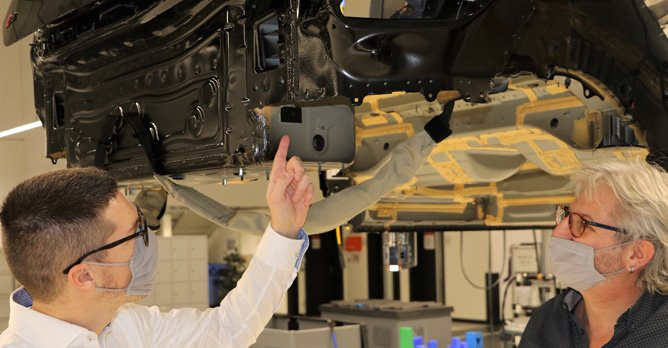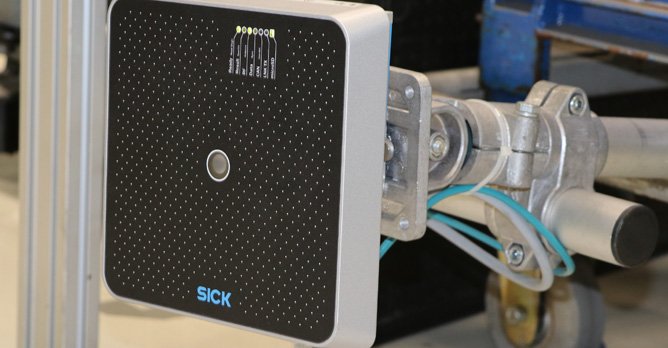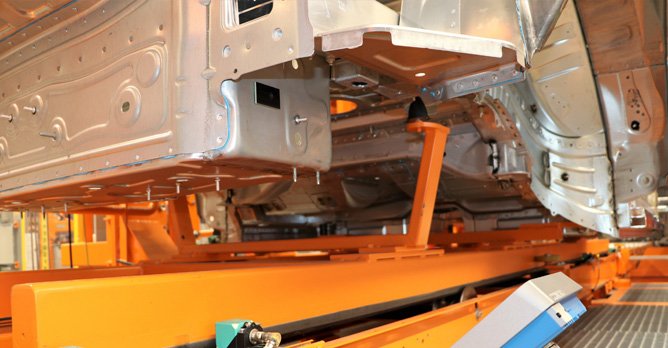Audi's Neckarsulm site takes the next step in becoming fully connected
07 Feb 2021|1,334 views
Making systematic progress toward the fully connected factory, Audi's Neckarsulm site is the first plant in the Volkswagen Group to use Radio-Frequency Identification (RFID) technology for vehicle identification throughout the entire production process, thereby laying another cornerstone for fully connected production. An enhanced RFID data carrier is being used for the first time in the production of the e-tron GT.
The technology itself is not new, Audi and other Volkswagen Group brands have been using RFID technology for vehicle identification for a number of years in areas such as the assembly line and the body shop. However, Audi's Neckarsulm site will now become the first automotive plant in the Group to deploy this technology across technical sections and throughout the entire production process.

The tag will be attached to the right rear section of the body and will stay on the vehicle as it passes through the paint shop and the assembly line right through to delivery to the customer. The chip contains an identification number. Key vehicle information, such as the body design, paintwork, motorisation and equipment of the respective car, can be retrieved with the help of a reader in the production areas.
Among other things, this ensures that every Audi that rolls off the production line is consistent with the configuration its new owner selected at the Audi dealer or at home. This involved previously different technologies as well as paper documents in some cases, making it impossible to connect all technical sections.
"In consistently using RFID technology on the vehicle throughout the entire production process, we are the first manufacturer to provide all of the relevant data on a single data carrier fully digitally and in real time," explained Christian Schmidt, who is part of the digitalisation of production and logistics at the Neckarsulm site. "In this way, we are laying important foundations for the comprehensive digitalisation of all our production processes," added his colleague Thomas Vogel.

Audi employees can make use of a drone that flies autonomously over the vehicle dispatch area, collecting all of the relevant data. As an important element of fully connected factories, RFID technology will establish itself as the standard across all systems at Audi's plants worldwide over the coming years.
When production of the fully electric Audi e-tron GT began in late 2020, Audi also became the first Volkswagen Group company to use RFID On Metal Tags (OMT) at its Neckarsulm site. This enhanced version of the data carrier takes one of its original weaknesses and turns it into a strength.
Previously it was not possible to attach an RFID data carrier directly to the vehicle body, as this interferes with communication between the tag and the reader. The solution is to insert a spacer between the body and the tag. The OMT removes the need for this spacer.

Audi's Neckarsulm site will take a leading role in the area of digital production and logistics throughout the entire Volkswagen Group in the future. The location already has extensive expertise in the areas of vehicle production, logistics and production IT.
The transformation is intended to strengthen these competencies in a targeted manner while developing the plant into a leading location in the area of digital production and logistics. Neckarsulm is focusing on 'end-to-end factory transformation' and the provision of tried-and-tested innovative IT solutions throughout the Volkswagen Group.
Making systematic progress toward the fully connected factory, Audi's Neckarsulm site is the first plant in the Volkswagen Group to use Radio-Frequency Identification (RFID) technology for vehicle identification throughout the entire production process, thereby laying another cornerstone for fully connected production. An enhanced RFID data carrier is being used for the first time in the production of the e-tron GT.
The technology itself is not new, Audi and other Volkswagen Group brands have been using RFID technology for vehicle identification for a number of years in areas such as the assembly line and the body shop. However, Audi's Neckarsulm site will now become the first automotive plant in the Group to deploy this technology across technical sections and throughout the entire production process.

The tag will be attached to the right rear section of the body and will stay on the vehicle as it passes through the paint shop and the assembly line right through to delivery to the customer. The chip contains an identification number. Key vehicle information, such as the body design, paintwork, motorisation and equipment of the respective car, can be retrieved with the help of a reader in the production areas.
Among other things, this ensures that every Audi that rolls off the production line is consistent with the configuration its new owner selected at the Audi dealer or at home. This involved previously different technologies as well as paper documents in some cases, making it impossible to connect all technical sections.
"In consistently using RFID technology on the vehicle throughout the entire production process, we are the first manufacturer to provide all of the relevant data on a single data carrier fully digitally and in real time," explained Christian Schmidt, who is part of the digitalisation of production and logistics at the Neckarsulm site. "In this way, we are laying important foundations for the comprehensive digitalisation of all our production processes," added his colleague Thomas Vogel.

Audi employees can make use of a drone that flies autonomously over the vehicle dispatch area, collecting all of the relevant data. As an important element of fully connected factories, RFID technology will establish itself as the standard across all systems at Audi's plants worldwide over the coming years.
When production of the fully electric Audi e-tron GT began in late 2020, Audi also became the first Volkswagen Group company to use RFID On Metal Tags (OMT) at its Neckarsulm site. This enhanced version of the data carrier takes one of its original weaknesses and turns it into a strength.
Previously it was not possible to attach an RFID data carrier directly to the vehicle body, as this interferes with communication between the tag and the reader. The solution is to insert a spacer between the body and the tag. The OMT removes the need for this spacer.

Audi's Neckarsulm site will take a leading role in the area of digital production and logistics throughout the entire Volkswagen Group in the future. The location already has extensive expertise in the areas of vehicle production, logistics and production IT.
The transformation is intended to strengthen these competencies in a targeted manner while developing the plant into a leading location in the area of digital production and logistics. Neckarsulm is focusing on 'end-to-end factory transformation' and the provision of tried-and-tested innovative IT solutions throughout the Volkswagen Group.
Latest COE Prices
August 2025 | 2nd BIDDING
NEXT TENDER: 03 Sep 2025
CAT A$104,524
CAT B$124,400
CAT C$72,190
CAT E$125,001
View Full Results Thank You For Your Subscription.




















